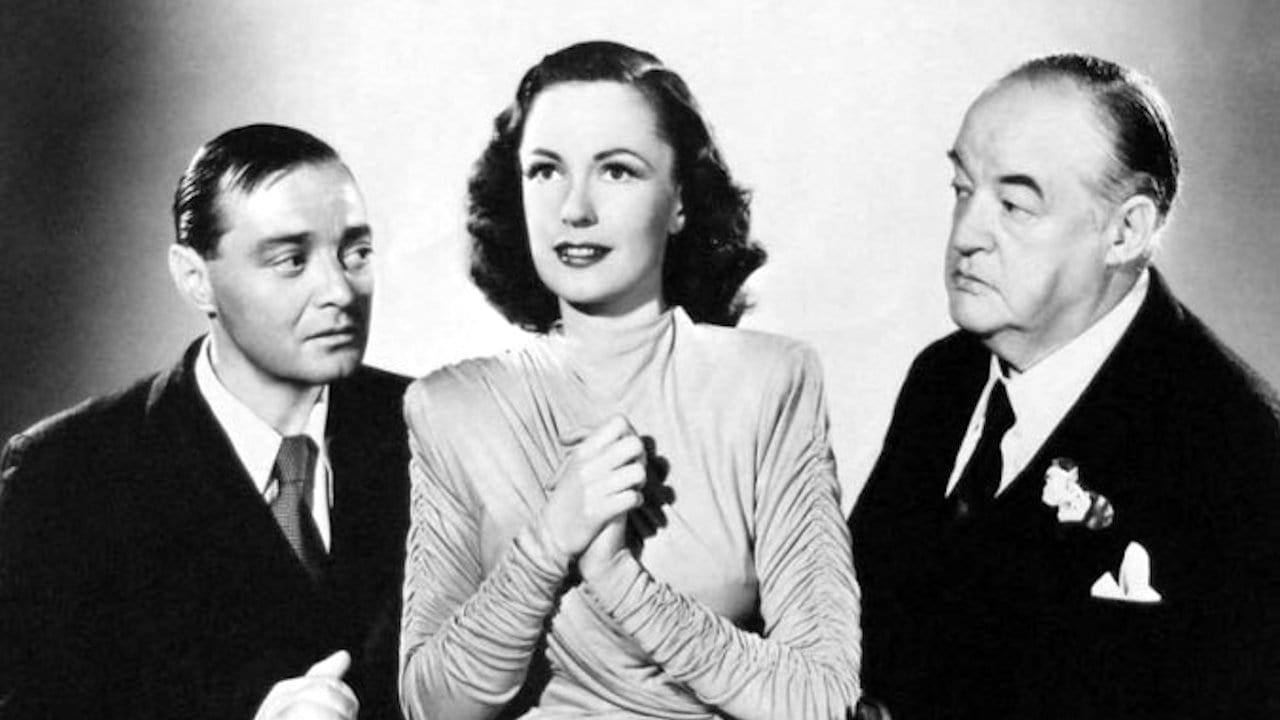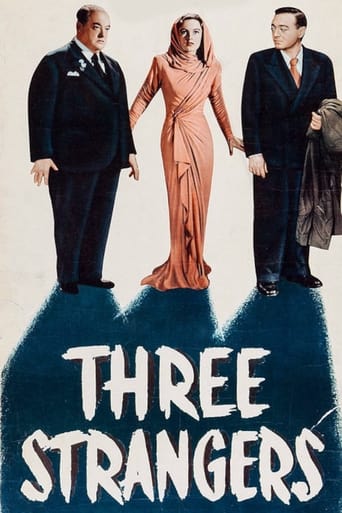

Three Strangers is directed by Jean Negulesco and written by John Huston and Howard Koch. It stars Sydney Greenstreet, Peter Lorre and Geraldine Fitzgerald. Music is by Adolph Deutsch and cinematography by Arthur Edeson.A tricky movie in structure as it constantly shifts between three character arcs to lead us to its resolution. Plot finds Crystal (Fitzgerald) luring Johnny (Lorre) and Arbutny (Greenstreet) to her apartment to make a wish in front of a Chinese idol known as Kwan Yin. It's believed that Kwan Yin will bring a wish true if requested by three strangers at midnight. They mutually agree on purchasing a lottery ticket and vow to split the winnings evenly. Naturally things don't go as planned The key issue here is that the three characters are tainted by their weaknesses, so as greed, paranoia, bad luck and jealousy grips their respective lives, Kwan Yin deals them the cards they deserve. Negulesco and his writers give the actors meaty parts, thrusting the characters into a world of embezzlement, murder, imprisonment and alcoholism. The vagaries of fate shows its hand as well, and with Edeson's black and white photography cosying up to the thematics, pic rounds out as a thriller cum drama with added mysticism for good measure.Huston's noir shadings are evident, and since it was written before it, this makes for a good appetiser to The Maltese Falcon. Good fun to be had here and the final outcome for our three strangers doesn't disappoint either. 7.5/10
... View MoreRidiculous writing and even with Geraldine Fitzgerald, Peter Lorre and Sydney Greenstart starring, basically nothing can really help this film.Fitzgerald draws the other two guys and they wish before some Chinese idol to have a sweepstakes ticket. The problem with them and this film is that they have far too many personal problems between them.Joan Lorring comes off after playing Bessie in her Oscar nominated "The Corn is Green," the year before to portray Lorre's girlfriend. At the beginning, she is still quite a shrew as in 'Corn,' but she suddenly comes to light and shows a compassionate side about her.Lorre can't even be his usual devilish way here thanks to the inane writing. Greenstreet has his moments such as his crack-up scene, but he too goes over-the-top in quite a campy performance.Fitzgerald here really steals the show as a woman who tells the ultimate lie to her husband's mistress so that she can get him back. She is the real shrew here. Unfortunately, the writing does her in as well.
... View MoreThree Strangers (1946) *** (out of 4) John Huston wrote the short story this is based on and his also co-wrote the screenplay with Howard Koch. In the film, Sydney Greenstreet, Geraldine Fitzgerald and Peter Lorre play three strangers who go to an apartment where they come in front of a Chinese goddess who is said to grant a wish if three people make the same wish at midnight. After making the wish the three go their separate ways and their lives take separate paths but soon they wind up together again with that one wish in common. Some have held this as an unseen masterpiece and while I wouldn't go that far, the movie does have some great performances that make it a must see. We basically get three different stories that are told in different style but are brought together by this magical wish. I enjoyed Lorre's story of a criminal who gets in trouble when a partner gets caught killing a cop. I found this segment to be the best because Lorre is just so cold yet funny in his role. The weakest is without a doubt Fitzgerald's because it just comes off too melodramatic, although she too is great in the film. What happens to Greenstreet's character at the end was a great twist to the film and his breakdown is masterfully done. I'm really not sure if the magical goddess thing should have been in the screenplay at all because it is rather far fetched and makes the film seem campy at times. With that said, if you're a fan of any of the actors then you'll certainly want to check it out. Again, I didn't see it as a masterpiece as some have called it but the film is still quite good for what it is.
... View MoreLegend has it that if three complete strangers meet up on the eve of Chinese new year and make the same wish in the presence of the Goddess Kwan Yin, their wish will come true. Crystal Shackleford is a woman obsessed by the goddess, an obsession that has grown particularly after the break-up of her marriage, she sets in motion a plan to grab two random strangers off the street. They turn out to be Jerome K. Arbutny, (Sidney Greenstreet) a rotund solicitor with serious financial issues and the possibility of being caught for insider trading, the second man is the dimunitive Johnny West (Peter Lorre), a petty criminal and drunkard on the run and suspected of being an accomplice in the murder of a policeman. The three strangers agree that their wish will be that a Sweeps Stake ticket in their possession should be the winning ticket. So in front of the mysterious statue on the stroke of midnight they place ticket inside the statue. Will their wish be granted? Written by John Huston apparently as a possible sequel to The Maltese Falcon, as this fell through, Howard Koch made some changes to the script to get the film made. The film starts with great promise, a mysterious state with supernatural powers, Lorre and Greenstreet reunited again, but it soon breaks down into odd episodic glimpses of the lives of each of the strangers, that are segued by a shimmering effect that would give you the idea it was all a dream or perhaps a flashback, it is at times a confusing muddled mess that ignores its original premise in favour of some light melodrama, a shame as in the hands of Negulesco I would have expected a more coherent film. Still though the weight of the cast can't but help make you smile and stay interested.
... View More